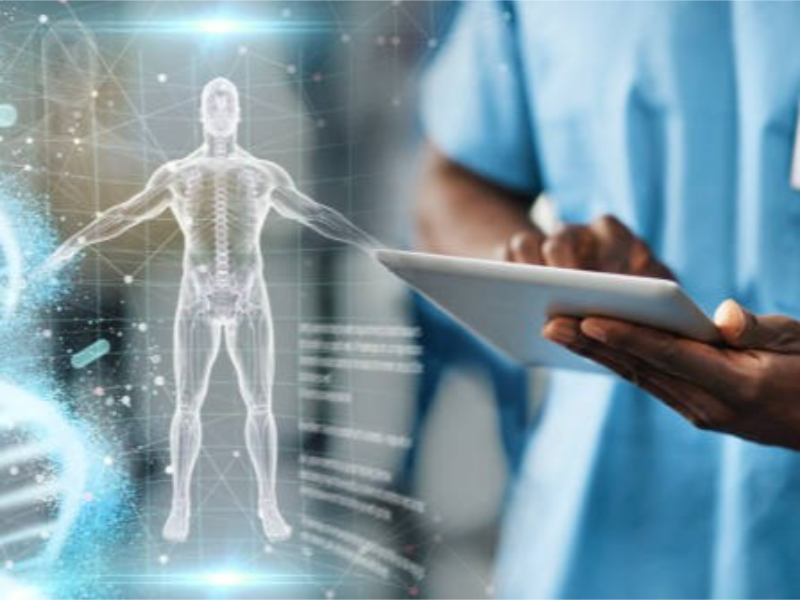- AI uses sentiment analysis, emotion recognition, and AI tools to diagnose mental health conditions, detecting early signs of depression or anxiety from text, voice, and facial expressions for faster intervention.
- Traditional methods, like clinical interviews, provide emotional insight, but AI can analyse large datasets quickly and identify patterns that may be missed, though it lacks empathy and clinical judgement.
- AI supports clinicians by aiding in early screening, diagnosis, and progress tracking, while still relying on human expertise for emotional connection and decision-making.
Artificial Intelligence (AI) is revolutionising industries around the world, and healthcare is no exception. In the field of mental health, AI is increasingly being used to diagnose conditions, monitor patients, and even predict potential issues before they escalate. As our understanding of mental health evolves, AI is emerging as a powerful tool, enhancing accessibility, enabling early intervention, and improving diagnostic accuracy.
Also read: Opportunities of AI in healthcare
Current AI applications in mental health diagnosis
AI’s primary role in mental health treatment is to assist in diagnosing conditions, monitoring patients, and even predicting mental health issues before they escalate. One of the most prominent applications is sentiment analysis.
AI has made significant progress in mental health diagnosis through technologies like sentiment analysis and emotion recognition. These tools analyse behavioural data to identify potential mental health issues and offer real-time interventions.
Sentiment analysis and emotion recognition
One of the key areas AI is making strides in is sentiment analysis. Sentiment analysis involves examining the emotional tone of a person’s language. AI systems can process written or spoken words and detect patterns that indicate distress or emotional turmoil. For instance, AI chatbots like Woebot and Wysa use sentiment analysis to identify potential issues like depression or anxiety from the user’s input. These chatbots monitor the user’s language for signs of negative emotions and respond with tailored support, offering coping strategies or suggesting professional help if needed.
AI doesn’t stop at text analysis. It also extends to voice sentiment analysis. By examining the pitch, tone, and rhythm of someone’s voice, AI can detect subtle emotional shifts that may be indicative of psychological conditions. For example, a person suffering from depression might speak in a flat, monotonal voice. AI systems can recognise these speech patterns and flag them for further investigation.
In addition to text and voice analysis, facial expression recognition is another AI tool gaining ground in mental health. Using computer vision, AI can identify facial micro-expressions—small, often subconscious facial movements—that signal emotional states like anger, sadness, or fear. These expressions can reveal emotions that individuals might not even be aware of or may be reluctant to express. Combined with text and voice analysis, AI provides a fuller picture of a person’s emotional state, which can aid in early diagnosis.
AI-assisted diagnostic tools
AI-powered systems can also assist mental health professionals in diagnosing conditions. Through machine learning algorithms, AI can analyse large datasets of patient information—such as behavioural data, social interactions, and even medical histories—to identify patterns and detect early warning signs of conditions like depression, anxiety, and PTSD. By providing healthcare providers with data-driven insights, AI enables quicker and more accurate diagnoses.
This is especially important for early intervention. Many mental health conditions, such as depression or anxiety, can develop subtly. AI’s ability to monitor ongoing patterns and detect changes in behaviour over time can help identify individuals at risk before they experience a full-blown crisis. Early detection allows for timely treatment and can prevent conditions from escalating into more severe mental health crises.
Comparing AI and traditional mental health diagnosis
Traditional methods of diagnosing mental health conditions are primarily based on clinical interviews, self-report questionnaires, and behavioural observations. While these methods are tried and tested, they have their limitations. AI, however, is quickly offering alternative solutions that complement or enhance traditional practices.
Traditional mental health diagnosis
Traditional mental health diagnosis typically involves a clinician assessing a patient’s symptoms through interviews and various diagnostic tools. During these sessions, the clinician observes the patient’s behaviour, listens to their concerns, and considers their medical history to make a diagnosis. The most widely used method of assessment is the Diagnostic and Statistical Manual of Mental Disorders (DSM), which provides standardised criteria for diagnosing mental health conditions.
One of the strengths of traditional methods is the ability to interpret complex, nuanced situations. For example, a therapist’s trained intuition allows them to understand how a person’s background, social environment, and life experiences contribute to their mental health. A clinician can recognise when a person’s distress is linked to a trauma, for instance, and adjust their approach accordingly.
 Traditional diagnosis
Traditional diagnosisAI’s advantages
AI offers several advantages over traditional methods, particularly in terms of speed, scalability, and precision. AI systems are able to analyse large amounts of data rapidly. A machine learning algorithm can scan thousands of patient records and identify patterns that might be too subtle or complex for human eyes. This capability allows for quicker diagnosis, which can be critical in the case of mental health conditions that often require fast intervention.
Another advantage of AI is its 24/7 availability. Unlike human therapists, AI-powered tools like virtual assistants and chatbots are always accessible. These systems can provide immediate support to individuals who may not have access to professional care, particularly in areas where mental health resources are limited. With AI, people can receive emotional support at any time of day or night, which is invaluable in addressing crises or urgent needs.
Furthermore, AI systems can be personalised. As AI continuously gathers data on an individual’s emotions, speech patterns, and behavioural changes, it can offer tailored advice. For instance, an AI-powered chatbot can suggest specific coping mechanisms based on the user’s unique emotional state, ensuring that the response is both relevant and effective. Dr Rahul Khanna, Program Director of the Mental Health State-wide Trauma Service and Director of Innovation and Medical Governance at Phoenix Australia, stated during a panel discussion at the University of Melbourne, “Within the trauma space, a lot of our work involves therapies that use language and story to heal, and of course, these are the areas where generative AI is performing exceptionally well.”
Within the trauma space, a lot of our work is in therapies that use language and story to heal, and of course, these are the things that generative AI in particular is doing incredibly well
Dr Rahul Khanna, Program Director of the Mental Health State-wide Trauma Service and the Director of Innovation and Medical Governance at Phoenix Australia.Traditional advantages
Despite the many benefits of AI, traditional mental health diagnosis still has its advantages. Human clinicians bring empathy and emotional intelligence to the treatment process, which is something AI lacks. For instance, while AI may be able to identify signs of depression in a patient’s speech, it cannot provide the emotional support that a trained therapist can. Therapy often involves emotional understanding, which is crucial for building trust and helping patients feel heard.
Additionally, human clinicians rely on clinical judgment, which involves using a broad range of subjective factors to make informed decisions. For example, a therapist might consider a patient’s cultural background, family dynamics, or life experiences when deciding on the best course of treatment. AI can provide data, but it cannot fully understand these complex factors or adapt in the same way that a clinician can.
Pop quiz
What is one of the main advantages of AI over traditional methods in mental health diagnosis?
A. It can provide emotional support
B. It can analyse large amounts of data quickly
C. It has more empathy than human therapists
D. It can replace human therapists entirely
(The correct answer is at the bottom of the article)
AI as an auxiliary tool for mental health diagnosis
Rather than replacing clinicians, AI should be seen as a complementary tool that enhances traditional mental health practices. When paired with human expertise, AI can significantly improve the effectiveness of mental health care. It provides additional data and insights, which help clinicians identify patterns they may otherwise miss. For example, AI tools can track a patient’s emotional state over time and highlight subtle changes that suggest issues like depression, leading to more accurate diagnoses.

AI also plays a key role in early screening, regularly monitoring mood and behaviour. If it detects signs of mental health concerns, it can alert both the patient and the clinician, enabling early intervention. Moreover, AI supports treatment tracking by continually monitoring progress, ensuring care plans are adjusted as needed. Beyond clinical support, AI offers personalised advice, suggesting coping strategies, relaxation techniques, and mindfulness exercises between therapy sessions. This ongoing support reinforces treatment and promotes long-term improvement.
Also read: Is XR the future of healthcare? Surgery, mental health, and brain rehab say yes
The challenges of AI in mental health treatment
While AI holds great potential, several challenges must be addressed. Firstly, AI lacks empathy, which is crucial in mental health care. Human therapists build trusting relationships with patients, offering emotional support and creating safe environments. AI, on the other hand, cannot replicate this emotional connection. While it can provide helpful suggestions, it cannot replace the human element of therapy.
Moreover, AI in mental health raises significant ethical and privacy concerns. Jodi Halpern, Professor of Bioethics and Medical Humanities in the UCB-UCSF Joint Medical Program, stated, “There are psychotherapies that are based on developing vulnerable emotional relationships with a therapist. And I’m very concerned about having an AI bot replace a human in a therapy that’s based on a vulnerable emotional relationship.” Mental health data is highly sensitive, so ensuring secure storage and handling is essential. AI systems must adhere to strict privacy regulations, and patients need clarity about how their data is used. Another concern is the risk of bias in AI algorithms. If AI is trained on biased data, it could lead to inaccurate diagnoses or unfair treatment recommendations.
Finally, AI can assist with diagnosis, but it cannot replace clinical judgment. Mental health care requires not only data analysis but also a deep understanding of the patient’s unique context and emotional state. AI, as powerful as it is, cannot fully grasp these nuances. It remains a tool, not a substitute for the experienced decision-making that therapists and psychologists bring to the table.
I’m very concerned about having an AI bot replace a human in a therapy that’s based on a vulnerable emotional relationship
Jodi Halpern, Professor of Bioethics and Medical Humanities in the UCB-UCSF Joint Medical ProgramThe future of AI in mental health treatment
The future of mental health treatment will likely be a collaborative one, where AI and human expertise work hand-in-hand. AI will continue to provide valuable data-driven insights and real-time support, but it will always require the emotional intelligence and clinical judgment of human professionals. AI can help make mental health care more accessible, especially in underserved areas, where therapists are in short supply. With AI tools available 24/7, individuals can receive immediate support, ensuring that mental health care reaches people who might otherwise go without.
However, as AI becomes more integrated into mental health treatment, it is important to address ethical concerns and ensure that AI systems are transparent, fair, and respectful of patient privacy. The role of human clinicians will remain crucial in overseeing AI-powered systems and ensuring that mental health treatment is both effective.
Quiz answer
B. It can analyse large amounts of data quickly













)





 English (US) ·
English (US) ·